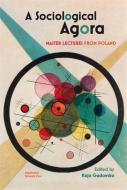
A SOCIOLOGICAL AGORA
- Wydawca: Wydawnictwo Uniwersytetu Jagiellońskiego
- Rok wydania: 2023
- Ilość stron: 270
- Oprawa: twarda
- ISBN: 9788323351009
powyżej 300zł Najniższa cena z 30 dni: 47,25 zł

Sztompka, Łętowska, Kubik, Fuszara, Zajadło, Skąpska, Kula, Frysztacki, and Polak all eminent representatives of contemporary social and humanistic thought confront the most insistent and imperative problems of the early 21st century. In this volume, these outstanding social scientists confront issues most vital to contemporary society: trust and responsibility, populism and democracy, new social movements, interpretations of the law and legal nihilism, a sense of community, dilemmas and tensions inherent in the welfare state, and the social position of an ecclesiastical system. The series of master classes, which forms the basis of this book, was presented during the height of the Covid-19 pandemic, becoming a space for exchanges of thoughts and experiences among individuals epitomizing diverse academic disciplines and social milieux. A Sociological Agora is the voice of those not indifferent to the future of the world.
In the midst of a pandemic, the Jagiellonian Universitys Institute of Sociology in collaboration with its Interdisciplinary Center for Socio-Legal Analyses as well as the Polish Sociological Association organized a series of Master Lectures. Presented virtually and open to the general public, these meetings with eminent Polish scholars addressed the most crucial and tenacious issues of our times. Active in their homeland as well as globally, the speakers are recognized specialists in sociology, jurisprudence, history, social work, gender studies, philosophy, theology, anthropology, and political science. The format encompassed a lecture followed by an online discussion with all interested attendees; the texts found herein comprise the fruits of those encounters. Disregarding geographic, temporal, and physical divides, this cyberagora created a space in which masters could find themselves amidst colleagues and students, sharing ideas, views, and experiences drawn from various academic disciplines and social milieux.
We are witnesses today of the progressive fragmentation of the sciences into ever more contracting sub-disciplines and specializations. This is leading to an acute deficit of holistic and dauntless scrutiny into our problems with all their grandiosity. Intensely missed is bold synthesis, a gaze anchored in deep wisdom and far-reaching knowledge, and an approach that is both friendly and open all geared towards the sharing of our perceptions of quiddity.